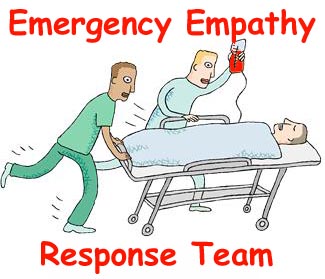|
|
 |
|
Responds to the
article"
The Limits of Empathy, New York Times by David Brooks
"The problem comes when we try to turn feeling into
action. Empathy makes you more aware of other people’s suffering,
but it’s not clear it actually motivates you to take moral action or
prevents you from taking immoral action"
|
Shared Google Doc: Empathizing with David Brooks and his “Limits of
Empathy”
http://bit.ly/pXDJS5
Shared workspace to work a a response.
October 4, 2011 -
The Limits of David Brooks’ “Limits of Empathy” - Jason Marsh
Over the last few days, a lot of people have asked me
about David Brooks’ Friday op-ed column in The
New York Times on
the “limits of empathy.” In it, Brooks argues that empathy is a
“sideshow” to moral action. Considering the glut of recent books on
empathy—such as Frans de Waal’s The
Age of Empathy and
Jeremy Rifkin’s The
Empathic Civilization—Brooks
writes that empathy “has become a way to experience delicious moral
emotions without confronting the weaknesses in our nature that prevent
us from actually acting upon them.” Empathy, in other words, is little
more than a fad. Instead, says Brooks, moral action stems not from
empathy but from a “sense of obligation to some religious, military,
social or philosophic code...
A considerable amount of research suggests empathy is
an important ingredient to moral action, if not the only ingredient.
|
|
|
Debunking “The Age of Empathy”?
by
Peter Corning, Ph.D.
Critics cite contrary evidence. Maybe empathy is not enough.
|
 |
|
"Brooks cites a recent review of the scientific
research by philosopher Jesse Prinz, who concluded that "These
studies suggest that empathy is not a major player when it comes
to moral motivation."
Brooks concurs and echoes the naysayers who have called empathy
a "fragile flower" that can easily be crushed by self-concern.
Brooks gives more weight to "a sense of duty" that is dictated
by social, moral, religious,
or military codes. He concludes that "empathy is a sideshow."
We need, instead, to debate, reform, enact and "revere" our
ethical codes." |
Beyond the Limits of Empathy
- Miki Kashtan, Ph.D.,
"Can empathy serve
as a reliable guide to action? David Brooks, in his recent article "The
Limits of Empathy,"
suggests that empathy is no guarantee that caring action will take
place. Participants in Milgram's famous 1950s experiments willingly
inflicted what they thought were near-lethal electric shocks despite
suffering tremendously. Nazi executors early in the war wept while
killing Jews. And yet those strong feelings didn't stop them. Why does
this happen? "
Notes:
Moral codes versus empathy?
-
Nazis had a very firm moral code.
-
fundamentalists have
a very firm moral code.
-
Empathy can be that moral code as well. (cognitive
empathy)
|
|







